Murder mysteries with deck building roguelite mechanics. Is there anything that can’t be turned into a deckbuilding roguelite?
Type: Single-player
Genre: RPG, Roguelite, Deckbuilder
Developer: Nerdook Productions
Publisher: Digerati
Release date: 2 Sep, 2021


Deckbuilding roguelite, how many games have been released in the last two years that fits that description? Despite being a sub-genre that’s been seeing a lot of releases in recent times there has not been a whole lot of truly bad ones, but even so, with so many deckbuilding roguelites on the market things are starting to feel a bit stale.
That’s where The Magister comes in. It’s a deckbuilding roguelite, but it’s also a deduction game, where you need to solve a murder mystery in a limited amount of time. Each time you start a new game you’ll end up with a somewhat randomly generated murder mystery that you’ll need to solve.
Story & Setting
Your predecessor was killed in the inn of the village of Silverhurst, and your job is now to figure out who killed them and why, and then report back to your superiors so the murderer can be brought to justice. That’s the setup for every game of The Magister, another magister has been murdered and you’ve been sent to bring the guilty person to justice.
The Magister does not have a deep story, and what is there is randomly generated every time you start a new game. The premise is always the same, but who murdered the previous magister, why and also how (but not where) will be different every time you start a new game. The exact personalities of all the NPCs will also change, even if it’s the same NPCs who are there. One game the doctor might be religious and go to the church regularly, in another game he won’t be, in one game the innkeeper might be cooperative, in another he’ll withhold information from you. The village of Silverhust will also always be the same every session, though some of the events surrounding it won’t necessarily be.
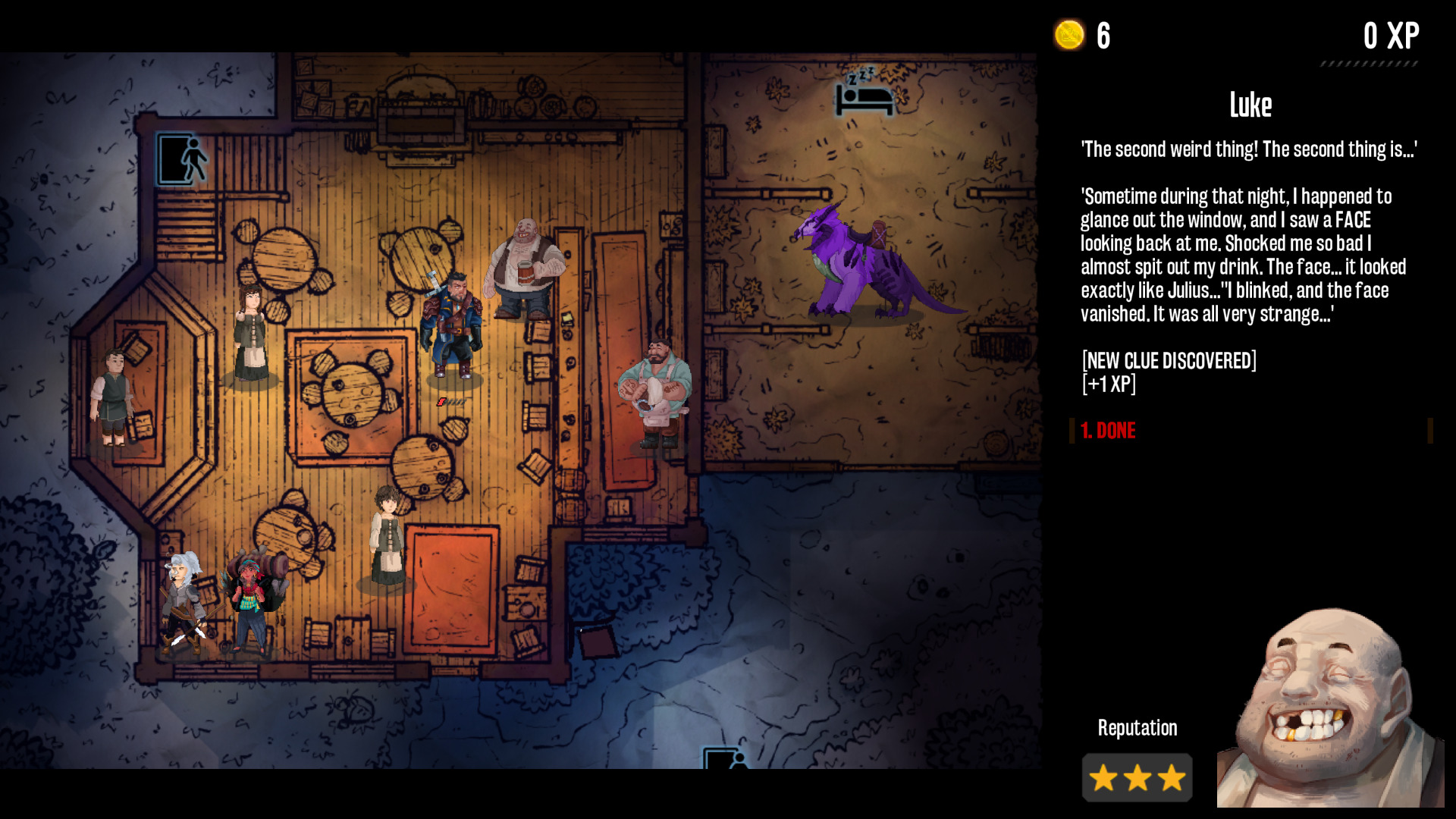
Presentation
The Magister is not the best looking game on the market, as you can probably tell from the screenshots. Everything except for NPCs is viewed from a top-down perspective, but every NPC are seen from the side. This looks a bit weird, but on the other hand if the NPCs had been seen from above, like everything else, they would have been hard to tell apart. Character animations can sometimes also be unnaturally fast, though that’s both a good and a bad thing, good because it speeds up gameplay, and bad because it can look a bit weird. The character portraits that you see when you talk to important NPCs are pretty good though, and show a lot of personality.
When it comes to sound, The Magister sounds fine, the sound effects are not annoying and the music is pleasant, but it’s not a game that will wow anyone with its sound design. Another song or two might have been nice though. As you might expect from an indie game like this the game is not voiced, and that’s probably for the best, as no voice acting is better than spotty voice acting in most cases, and with the number of different NPCs voicing all of them with good voice actors would have been expensive.
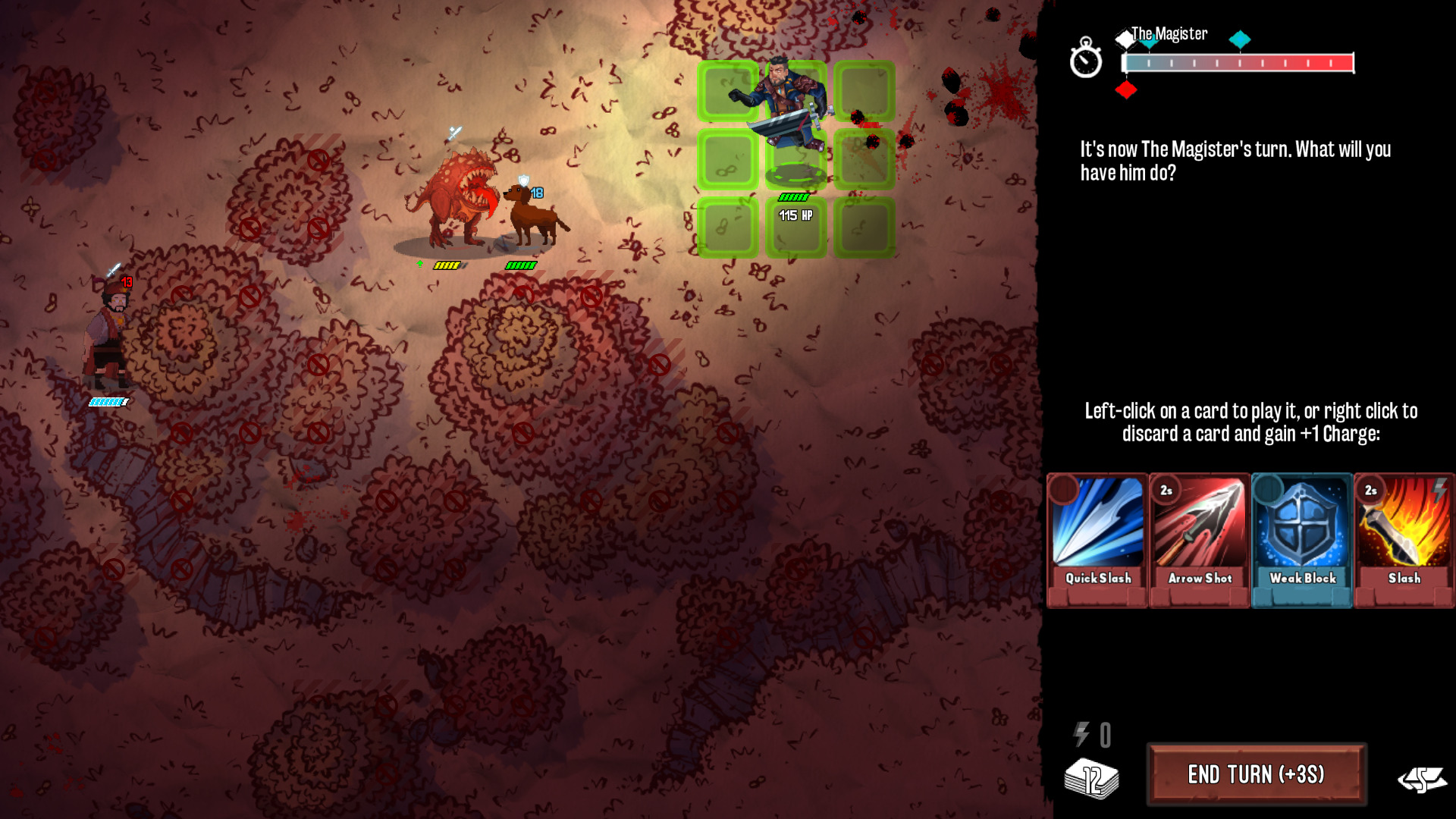
Gameplay
Your goal in The Magister is simple, find the murderer and bring them to justice. There’s just one small issue: Nobody saw the actual murder happen, and most people have a motive. So you need to gather clues and try to piece together who the murderer might be. All of this needs to be done in just two weeks. At the start of the game you have very little to go by, but as you talk to people and get to know them you’ll find out more about them, and maybe also more about the murderer.
The Magister is a game about eliminating possible suspects, until only a single one remains. Maybe your investigation reveals that the murderer was strong? Then that means that anyone who’s not strong is no longer a suspect. Did they hurt their arm? Now you have two things to base your accusations on, and you need to look into anyone who’s both strong and hurt their arm. Actually getting the evidence is not necessarily all that easy though. You need to talk to the people of Silverhurst, earn their trust, and also spot their lies. Just because someone did not murder the previous magister does not mean that they’re telling you everything they know, they might well have been near the murder scene, but lied to you about it, and so you need to call them out on any inconsistencies in their stories (if you’ve played a Phoenix Wright game you’ll have a good idea of how this works) and only then they’ll tell you anything they might have seen on the night of the murder. There are also clues scattered around different areas, including those you do sidequests in.
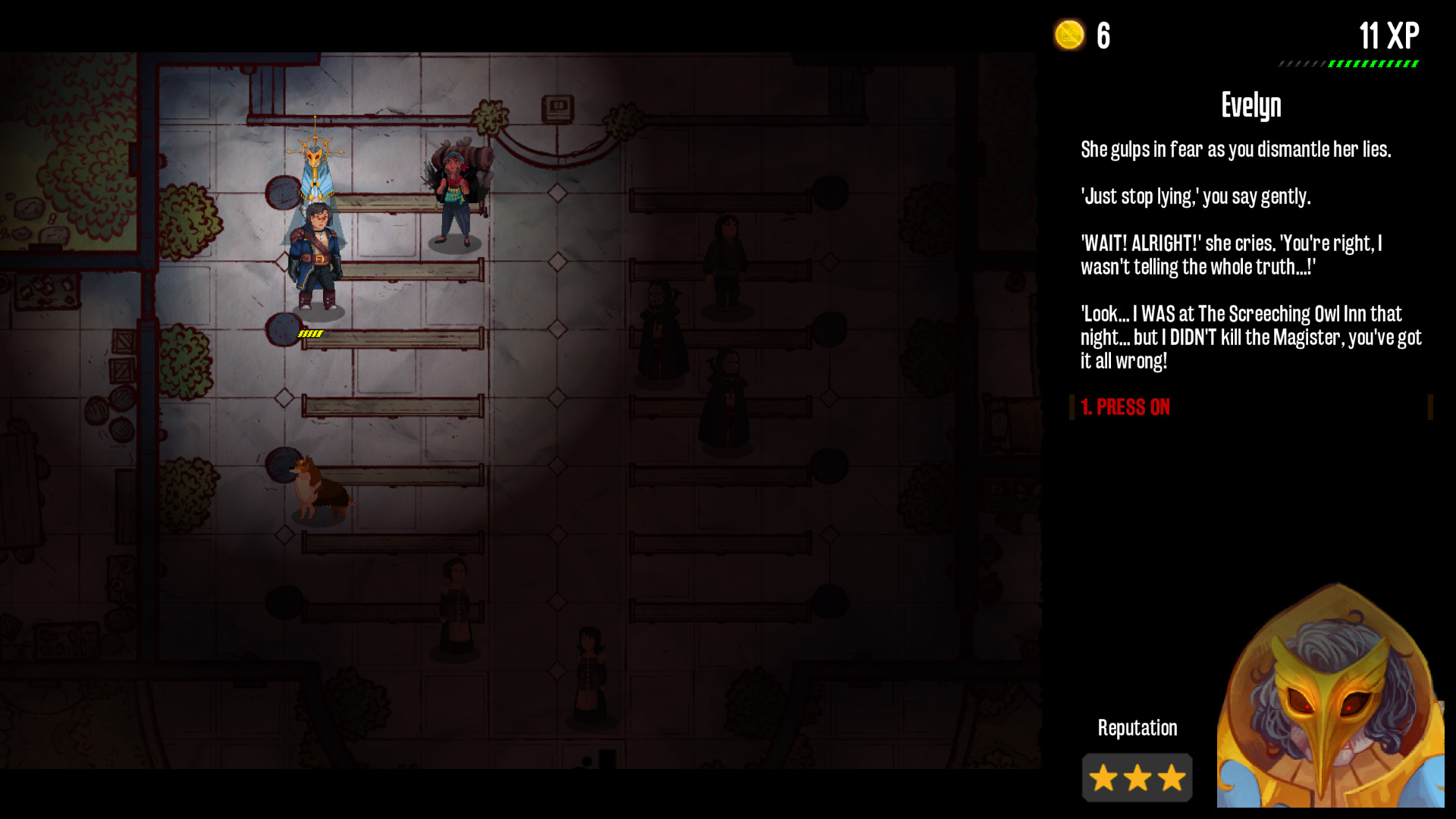
In order to get information out of the people of Silverhurst you need to get on their good side. Exactly how depends on the person you’re trying to talk to, the inn keeper for an example will simply like it if you stay in the inn and the merchant likes it if you sell things to her, but for most you need to do side quests. These are short, semi-randomly generated quests that usually involves fighting someone/something or try to talk someone down (you often have a choice regarding the approach).
It’s during fights that the deckbuilding aspect comes in. You’ve got a deck of cards that you add to over the course of the game and once the fighting starts you’ll draw a hand of cards. You can, once it’s your turn, then play any number of cards from your hand, but most cards have a time-cost, where if you play them it will take longer until it will be your turn again. Play multiple cards with a high time cost and the opponent might even get to act twice before you’ll have a chance to act again. Your goal in a fight is simple, kill the enemy before they are able to beat you down. In order to kill the enemy you’ve got attack cards, and in order to not get beaten down you have defense cards, and building a balanced deck with these is the key to victory. Losing a fight is not the end of the game though, and if you get knocked down you’ll wake up in the inn at night (which can be costly as if you get knocked out early in a day you’ll waste that day).
Talking someone down also uses a deckbuilding system, though it works differently. Instead of bringing your own deck through the curse of the game you have a few default cards and then you build a new deck during that social encounter. Your goal is to get the opponent’s “rage” to 0, and you do this by playing cards that lower their rage. Unlike physical combat where cards have a time cost, here each card has an “empathy” cost which is a currency you get from playing certain other cards. You can also buy new cards with empathy that gets added to your deck. The main cards that lower the opponent’s rage gets more expensive to play every time you play one so you need to improve your deck as to more efficiently give you “empathy” without it becoming so bloated that you end up never getting any of the cards that lower the opponent’s rage.
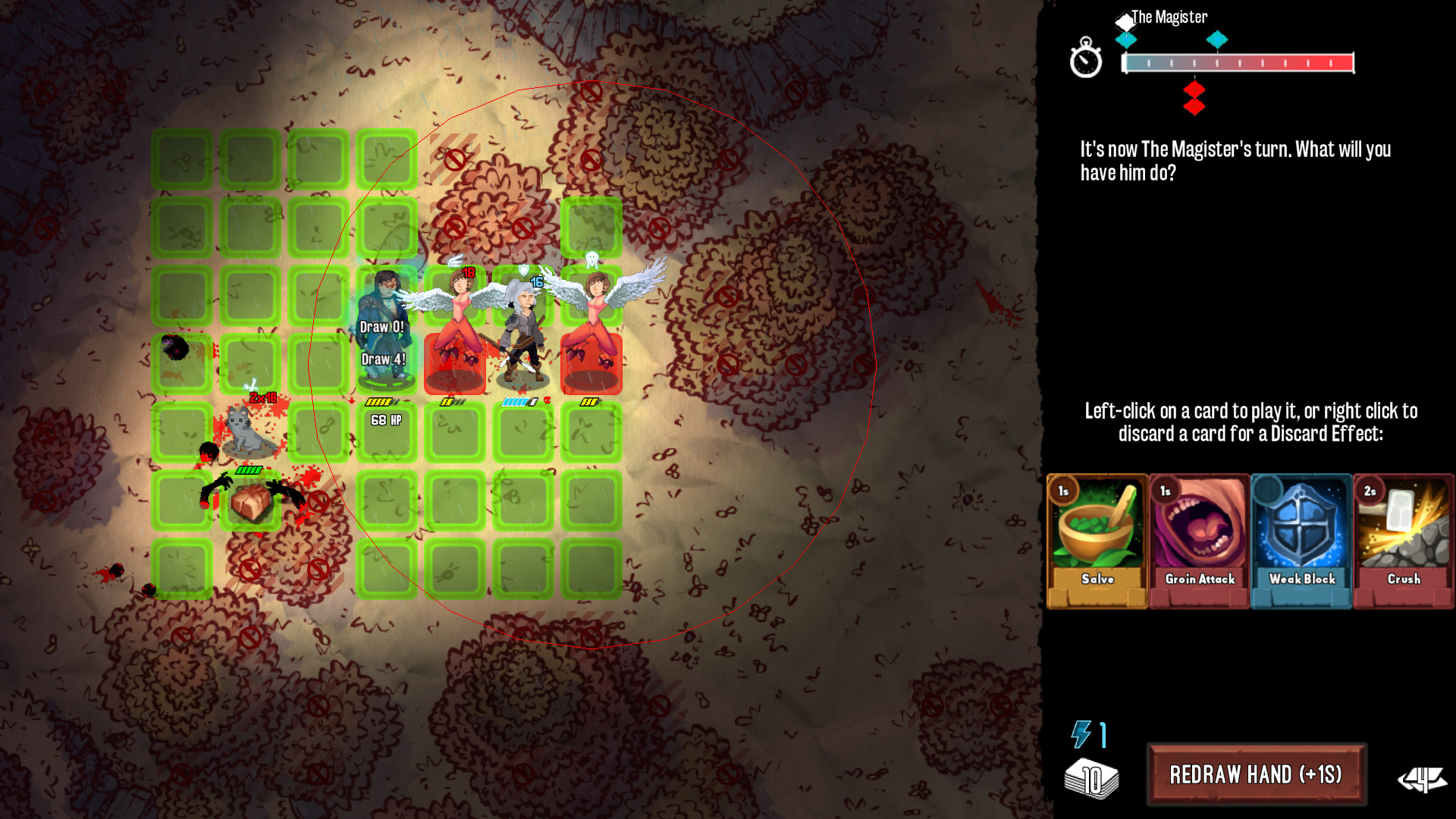
Traveling between locations costs time, and each side quest has its own map location that you need to travel to. There are also a few locations that are always on the map, like the inn and the village square, and it also costs time to travel to those. No matter where you go the time cost will always be the same, so when traveling to a location that’s not just there for a specific side quest you’ll want to try and make sure that you can do as much as possible there. If say you have three side quests that you need to hand in to people in the village square you’ll want to do all three before going there again, unless you have a very good reason to go there before you’re done with all the side quests.
Doing side quests as well as finding clues and winning fights will earn you experience points. Earn enough and you’ll be able to unlock new perks. Every time you level up you’ll get to pick one of three randomly selected perks. You’ll also at certain times get to pick a new skill. Skills are similar to perks, but they belong in one of three categories and you need to unlock the category first. They also tend to be more impactful, opening up new ways to solve problems or making certain things significantly easier. You can also use money to buy upgrades and even pets who can help you in combat.
Once you’ve gathered enough clues to know who the guilty person is it’s time to contact your superiors and tell them what you’ve found. After that the game will end and you’ll be told if you turned in the right person. If you did a good job and made sure that the guilty party faced justice you’ll then unlock new, harder, difficulties.
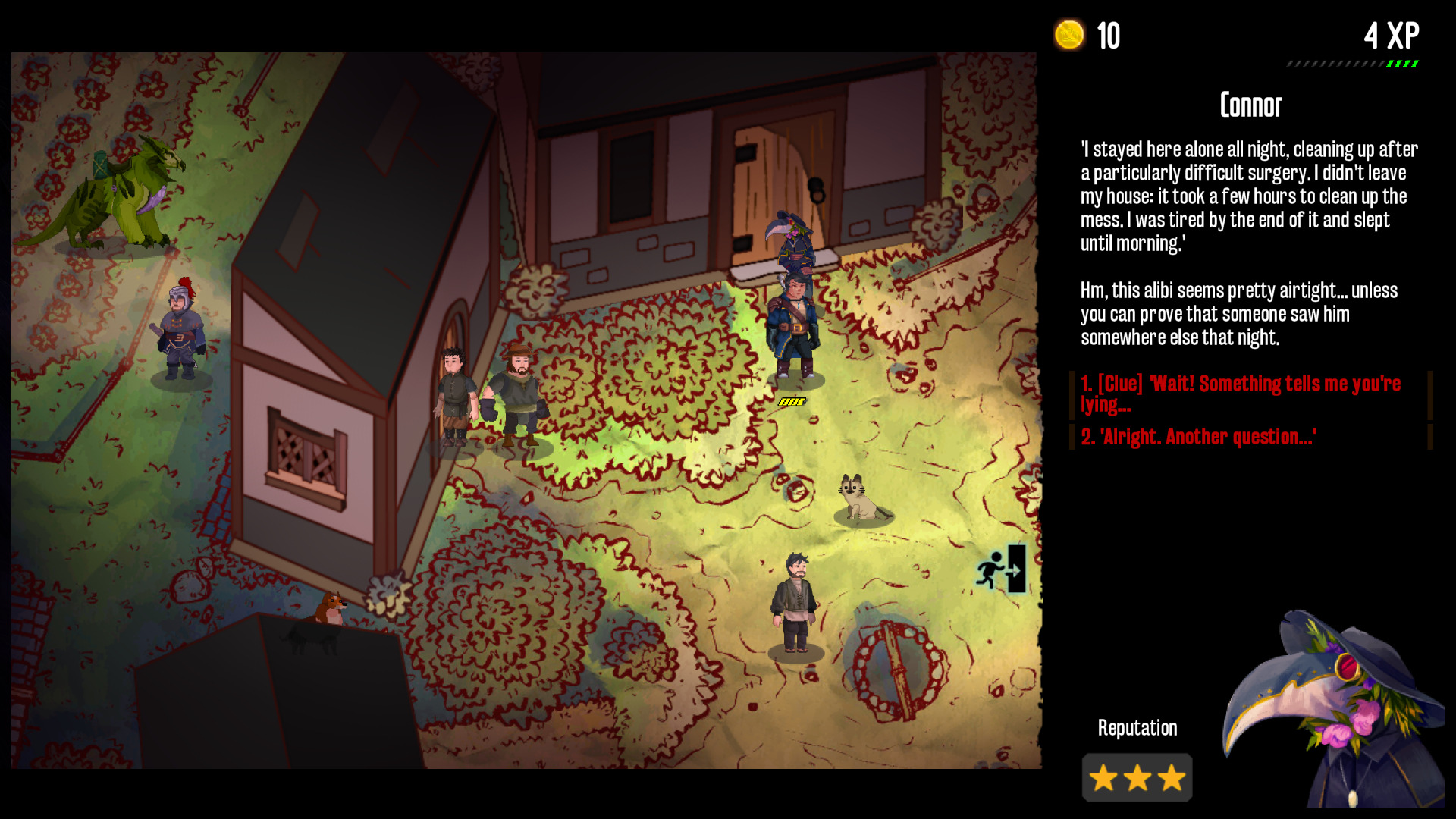
Closing Thoughts
The Magister is an interesting take on the deckbuilding rougelite genre and offers something that’s quite unlike anything that’s been done before. And it is fun to play, at least for a while. The Magister has one major issue though, and that’s its lack of replay value. While the game does randomize a lot of things, ultimately each session tends to feel and play similarly to the last. There are a limited number of maps and side quests and the process of finding the guilty person is always similar.
The Magister might be worth picking up for anyone who likes the idea of mixing a deckbuilding roguelite with a murder mystery game, but unless you think the idea sounds amazing it might still be worth waiting for a sale. The game is worth playing through at least twice, but rougelites need more replay value than this.










